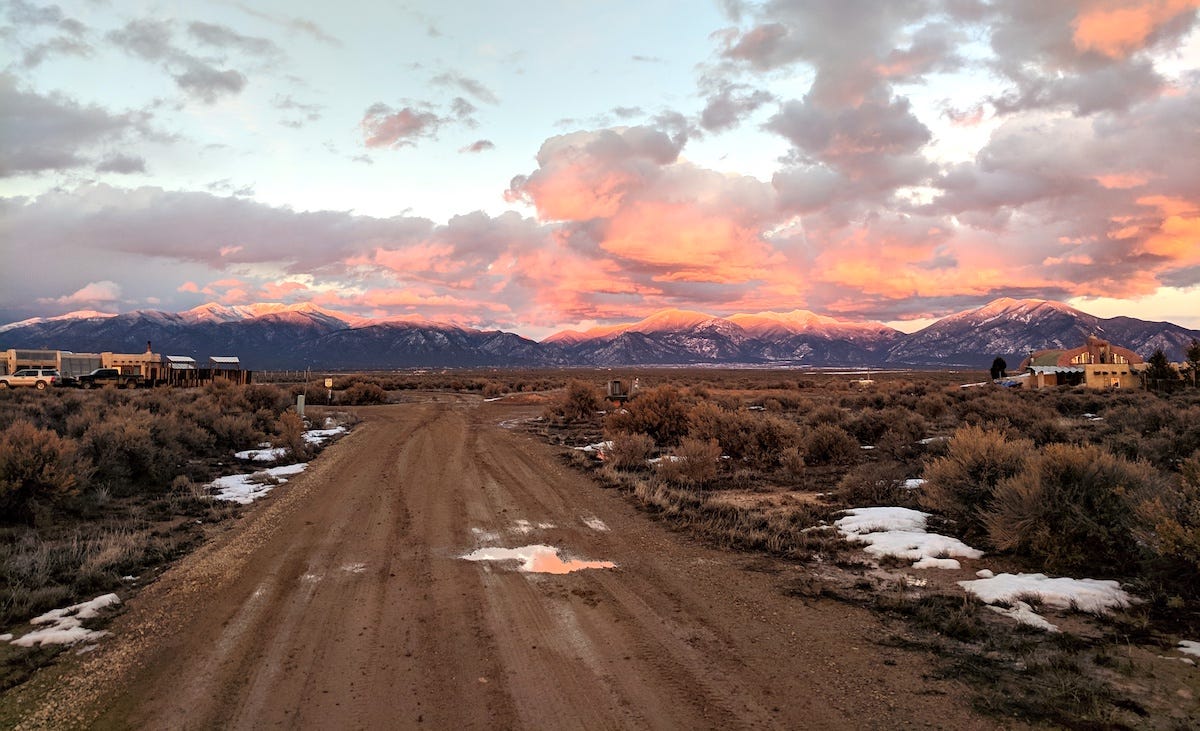
Sangre De Cristo Mountains above Taos
This newsletter is now a podcast too. I will send an email when the podcast is available on all podcast platforms. I also have a donate button on the bottom of this post.
I have often felt confused in my life about how I fit into the world as an artist. Or in simpler terms, how my ideals can coexist with a world that is inevitably not ideal. Partly, the confusion I feel is about finding my place, my work. While I know what matters to me, I've had a hard time actualizing it.
This poem, from my Body of Water manuscript, is my way of writing about this confusion. It was written when Anna and I were driving around in our car in Northern New Mexico, looking for a place to live in Taos. We slept in canyons and closed campgrounds and somehow it was cold and rainy almost every day; which, at 7,000 feet, when your car is packed with your worldly belongings, is not the ideal situation. It means dealing with wet gear on top of socks, boxes, and kitchen stuff.
Looking back, it was just a month or so of this kind of situation before we found a small adobe apartment in Talpa, a spot in the road just outside of Taos. But for some reason, when enmeshed with the difficulty of finding a place time seems to drag, and everything feels impossible.
Nowadays, I am still not sure what my path is towards offering something. I think I hit on it when trying to understand my confusion in this poem: I want to be someone who goes out into the larger world, then comes back to the human realm with something to offer. And maybe the offering will only be who I become. There is a saying in Buddhism and probably in other places: the messenger becomes the message.
Confusion is a kind of loop. So what do I come back to again and again? The idea that I want to be a steward of something. Just a caretaker. Not to leave a permanent, indelible mark, but to maintain something, even restore something—heal something. Then be ready to pass it on to the next person, place, animal. Again, and again, and again.
But how do I do that with no money, no platform, no place particularly in mind? Being in community seems to be part of it. But to have a home, a place, and somewhere to steward isn’t as easy as it sounds.
It’s not that I want to start some kind of foundation. I just want some kind of living space on the edge of a field, with trees behind, and a stream nearby, that I take care of. Maybe a place people can come by and feel at peace in. And then, to be able to work on writing, and to make enough money in an ethical way. That’s the entire goal.
This poem also has notes of pain and chaos—about a murder that happened down the road from our little apartment, about the barbed wire people relentlessly string and layer everywhere to protect their property, and the dogs that will chase and attack you if you get too close—all done to protect what people have worked hard for.
Yet for me, I don’t desire protection of my hard earned work. I want my work to be open to all, accessible to all, free for all. I don’t want to profit off my hard work, or protect it.
That’s what I have to say about this poem.
Reader Note: Please flip your phone to wide orientation, or read on a laptop for proper line breaks.
Taos means Red Willow. The people of Taos Pueblo call themselves The Taos People, and a long time resident of Taos in general is called a Taoseño. The Red Willow People.
Taos — Being Born
First night
of wood smoke.
First flow of water.
First time picking trash from the acequia
amidst old rocks
placed by hands passed on.
Clear water runs
below roads
past dogs
under barbed wire hung
by someone.
And after a hundred years
falling down
and rusting
in the water.
Across streams are strands
of old, bad barbed wire as if
water were something to be protected from life—
Though I see no sign saying this or that.
And a man was shot
just a hundred feet down street
from where this acequia flows
under barbed wire.
At the end of a road
I open a smooth wire gate
and walk past wild roses
and along Rio Chiquito,
where an acequia is blocked, pools—
the water floods a field.
Six old apple trees
grow above the dry stream
that sometimes has water.
Their fruit hangs heavy
above strands
of rusty barbed wire.
~~
The water less every year
sixty degrees between day and night
people grow things still—
burn brush fires
late at night.
An old man stands, and says
“The best way
is to go into the field
and make a fire
and cut them stalks
and cook them on the fire.
Asparagus in the store
comes five hundred miles
ten days old by the time it gets here.
Isn’t the same thing
as what grows out of this ground
beneath my feet
that I cut and I cook, and I eat.”
Rocks rise
on the edge of a piñon plain
where I was born.
There were trees
mostly: cottonwoods.
Hills, arroyos, dry rock
clean streams
the sun rising or setting
crystal blue skies.
And children
don’t notice heat or cold, or what is a home
until they lose it.
Patterned portraits on yellow sand, red, green, or white.
Roasting chiles, eating at night.
No sky as clear as a desert,
no mind as clear as desert air
no thoughts as clear as one that looks back
as I enter again.
Taos, New Mexico
—against the mountains—aspens high—piñon lowlands,
rio grande cañon, hidden down low—
entering the world through our tent flap
after all night rain and cold.
Clouds shredding over
dark black mesa
eyes filling with tears
for no reason I know—
hands tremble to light the fire—
all night rain, and cold.
~
Arroyo of rock chunks
by rainwater, sand dry
tracks of another person
long gone by.
~
Slept in a closed campground
frost night before, and after
tent covered
with glossy pitch from a drought stressed pine
sticky zipper stuck and broke
on the tent. Our home.
Taos.
Low clouds and the huge view, coming down in the car
adobes, as long ago, and cedar stick fences.
Tiny backroads, colored old graveyard.
Taos.
Twist around
to a coffee place
a man talks, for an hour—
“the grizzlies eat nuts of the white pine
but they are dying
to the bark beetle
so bears come lower, for corn
and get shot.”
Taos.
What work is mine?
Where did I end up?
Four years back
was told to speak
for what couldn’t.
Yet I haven’t.
Taos.
Still raining
snow high
water flowing
from the mountains
to keep what grows in the lowlands alive
near Taos.
Tempted to say: I will do the same
to places quiet I go
and I sit, I say
nothing.
Then come down to towns
like a spring that flows
without ending, or offering anything
but itself.
Taos.







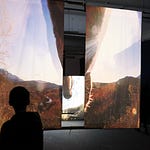
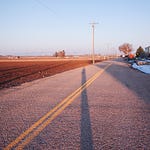
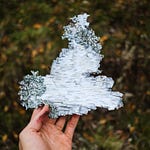


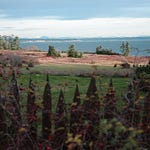
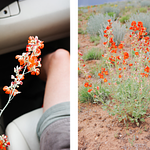

Taos, Being Born